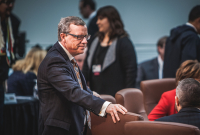Support strong Canadian climate journalism for 2025
Prime Minister Justin Trudeau lost the harshest critic of his plan to impose a carbon tax with Brad Wall's surprise announcement Thursday that he's retiring as Saskatchewan's premier.
But just as Trudeau pulled that persistent thorn from his right side, he was stabbed in the left side by another thorn as British Columbia's fledgling NDP government unveiled plans to block construction of the proposed Trans Mountain pipeline.
The twin announcements underscored the political teeter-totter Trudeau has been riding as he attempts to prove it's possible — indeed necessary, in his opinion — to simultaneously combat climate change and build new pipeline capacity to get western Canada's fossil fuels to tidewater.
Wall has threatened to go to court to prevent the federal government from imposing a carbon tax of $10 per tonne — rising to $50 in 2022 — on provinces that don't implement a carbon pricing regime of their own by next year.
Saskatchewan is the only province that has flat-out refused to even consider carbon pricing, which Wall maintains would devastate the province's already struggling oil and gas industry.
While his successor will doubtless carry on the crusade, along with federal Conservatives led by fellow Saskatchewanian Andrew Scheer, Wall has been the most articulate and highest-profile opponent of the scheme with a knack for simplifying the complicated issue. For instance, he's summed up the federal carbon tax plan as "a ransom note."
"He was a fierce defender of Saskatchewan and western Canada on this critical issue so it is a loss in that sense," Conservative Sen. Denise Batters, a long-time friend and supporter, said in an interview.
Just how much relief Wall's departure will give the Trudeau government on the carbon pricing front remains to be seen.
"Whenever a person who has cut such a large figure, certainly in Saskatchewan politics but also on the national scene, when a person of that longevity and strength decides to make a break and go do something else, it's obviously a major change," Public Safety Minister Ralph Goodale, who holds the Liberals' only seat in Saskatchewan, said in an interview.
"What will result from that, who the successor will be, how it will effect the policy debate about various issues from time to time remains to be seen."
Goodale praised Wall's unquestioned "passion" for Saskatchewan and pointed out that, apart from the climate change file, he has worked co-operatively with the federal Liberals on a host of other issues: health care, child care, infrastructure, softwood lumber and the upcoming renegotiation of the North American Free Trade Agreement.
Wall briefly stoked renewed speculation Thursday that he may jump to the federal political arena when he said he's leaving politics in Saskatchewan. "I should have said anywhere," he clarified later.
Goodale said the federal carbon pricing plan is "an absolute linchpin" for getting approval of any pipelines.
"With carbon pricing in place, we can not only argue the economic gains that come from pipelines ... but also the environmental integrity of the process because it is rooted in that fundamental principle of carbon pricing," he said.
Yet, just as Wall's departure will silence the leading critic of Trudeau's carbon tax plan, the government has to contend with a newly minted NDP government. It reasserted Thursday its campaign vow to use "every tool available" to block Kinder Morgan's proposed Trans Mountain pipeline expansion, which the Trudeau government has approved.
In the few weeks following the new government's swearing-in last month, there was briefly some small hope among federal Liberals that Premier John Horgan might back off. Indeed, the pipeline wasn't even mentioned when Horgan had a first, congenial meeting with Trudeau a couple of weeks ago, at which the two leaders chose instead to focus on issues upon which they agree.
That hope was dashed with Thursday's announcement that B.C. is joining the legal fight against the pipeline. The Horgan government also warned Kinder Morgan, which had planned to start construction in September, that the province has rejected five of eight environmental management plans required to begin work on the project because of inadequate consultations with effected First Nations communities.
"Until that has been completed, Kinder Morgan, with the exception of some private land and some clearing of right-of-way, cannot put shovels in the ground," said B.C.'s environment minister, George Heyman.
A spokesman for Natural Resources Minister Jim Carr said the federal government "will stand by" its decision to approve the Trans Mountain expansion, "based on facts and on evidence and what is in the national interest."
"We have taken an approach to resource development that will grow our economy and protect the environment," Alexandre Deslongchamps said. "Our government believes that these priorities go hand-in-hand."
Goodale said the Trudeau government only approved the Trans Mountain project after thorough, comprehensive and inclusive consultations "where all points of view were heard and treated respectfully and taken into account."





Comments